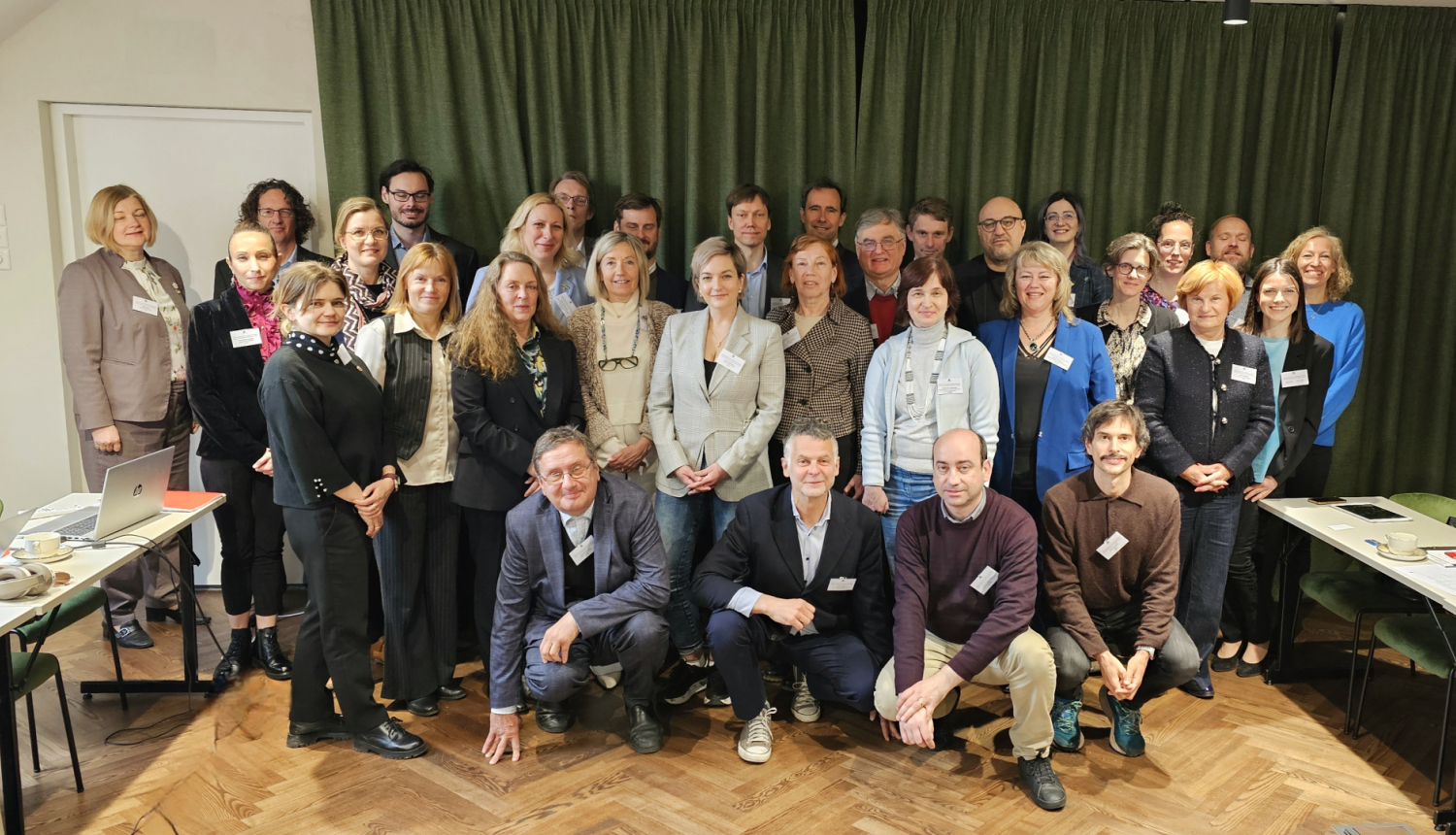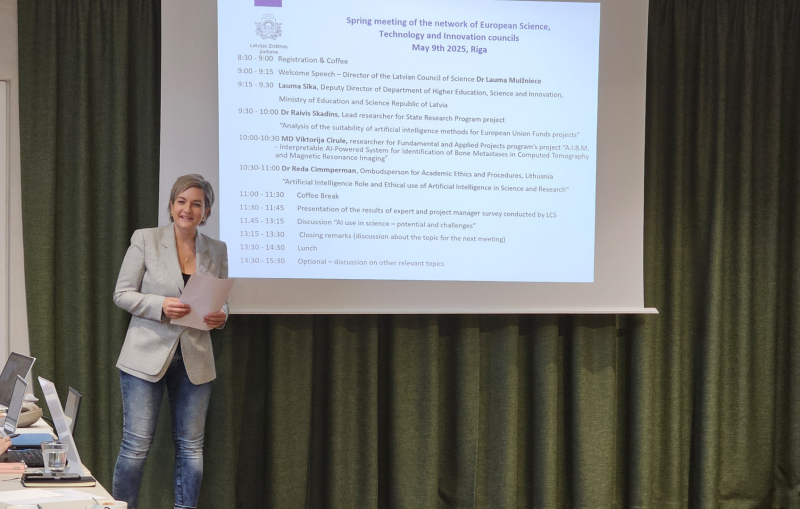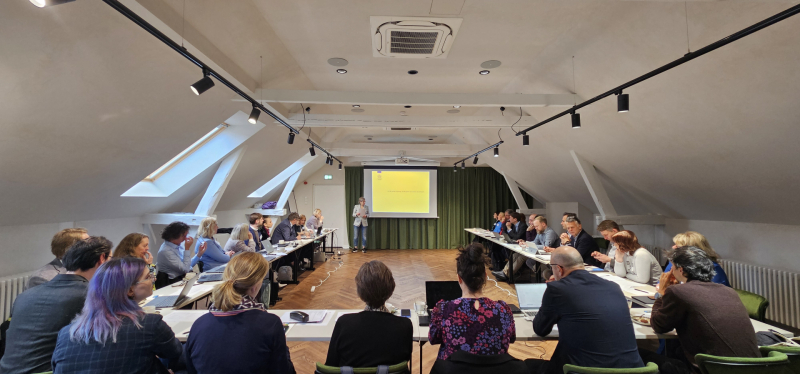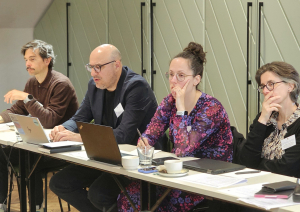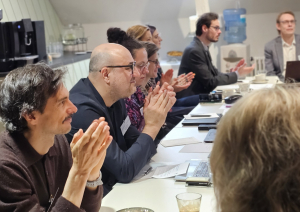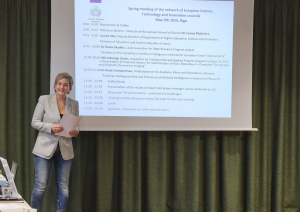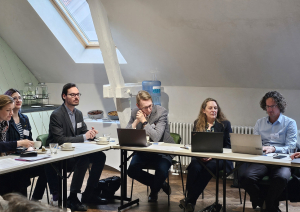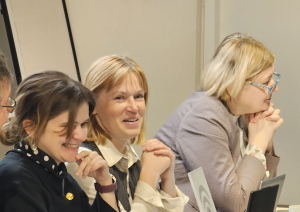On May 9, 2025, Riga hosted a meeting of the European Research and Innovation Councils' Secretariats, organized by the Latvian Council of Science. This closed-format working meeting brought together 34 representatives from 15 countries to share experiences and strengthen cooperation in the fields of research and innovation. The focus of the event was the use of artificial intelligence (AI) in science. Discussions on opportunities and risks particularly emphasized the need for a responsible, transparent, and human-centered approach to integrating AI in research.
Represented countries included Portugal, Germany, Finland, Estonia, Ukraine, Belgium, Iceland, the Netherlands, Austria, Denmark, Lithuania, the Czech Republic, Switzerland, Spain, and, of course, Latvia.
The event was opened by Lauma Muižniece, Director of the Latvian Council of Science:
"The fact that this meeting of the European Research and Innovation Councils’ Secretariats is taking place in Riga today is a testament to Latvia being recognized as an active partner and a space for intellectual exchange in European science governance. A closed-format working meeting like this builds trust, fosters deeper understanding of each other's experiences, and allows us to address shared challenges—from AI ethics to more effective innovation policy. We are aware that behind policy papers and data analyses lie decisions with far-reaching impacts on society. Therefore, these conversations are not only beneficial, but essential. The Latvian Council of Science is honored to host this year’s meeting, as it helps shape a common European perspective on the future governance of science and innovation.”
Lauma Sīka, Deputy Director of the Department of Higher Education, Science and Innovation at the Ministry of Education and Science Republic of Latvia, emphasized during the meeting that AI is already becoming an integral part of scientific research, but its use must consider not only technological aspects, but also ethical and societal dimensions.
“Artificial intelligence is changing the nature of science, but its integration cannot be purely technological—it must be based on trust, transparency, and human accountability, which are at the core of European scientific values,” she noted, adding that Latvian scientists and policymakers are closely following developments at the EU level.
On May 22–23, 2025, the EU Competitiveness Council is expected to adopt the proposal "Towards an EU Strategy for the Use of AI in Science", which will lay the foundation for systematic policy in this area. Key elements include interdisciplinary cooperation, improved access to high-performance computing resources, development of digital skills, and the ethical use of AI in research.
As part of the meeting, participants also had the opportunity to attend presentations of three research projects exploring the use of AI in EU-funded project analysis and medical diagnostics, as well as the ethical considerations associated with AI use in science. The meeting concluded with a discussion on the potential and challenges of AI in research.
The Latvian Council of Science has already developed guiding principles for the use of AI in preparing research projects and conducting expert evaluations. These include assigning responsibility for the quality and authenticity of AI-generated content. For example, experts must disclose the tools and algorithms they use and comply with personal data and confidentiality protection requirements when working with AI.
Project applicants are also required to specify whether and how AI was used in the development of project descriptions. They remain responsible for the independence and originality of the methodology, results, and interpretations, and it is strictly prohibited to share personal or sensitive data with third-party AI tools.
Currently, more than half (61%) of project leaders surveyed by the Latvian Council of Science acknowledge using AI in their work. For 78% of them, AI somewhat facilitates research activities, while 21% find it significantly helpful. Among surveyed experts, 43% use AI in daily research tasks. The majority report that AI somewhat eases their work (77%), while 18% say it clearly improves it. Only 5% of experts said AI made their work more difficult, and just one project leader reported a similar experience.
Latvia actively participates in these discussions, recognizing that the smart, safe, and values-based use of AI in research is a prerequisite not only for innovation development but also for maintaining public trust in science.
About the Meeting of European Research and Innovation Councils’ Secretariats
This annual high-level closed-format working meeting brings together science and innovation policymakers from European countries to foster mutual cooperation and align strategic visions. The goals of these meetings include:
-
Sharing best practices, particularly in science governance, innovation funding models, and the integration of new technologies such as AI;
-
Promoting policy coordination to ensure more coherent development of the European Research Area;
-
Building institutional trust through open and professional discussions on values, challenges, and opportunities.
These meetings are hosted by different European countries each year, providing an opportunity for each to showcase its research priorities and strengthen its role within the European scientific community.
The AI tool ChatGPT (OpenAI) was also involved in the translation from Latvian to English.




